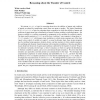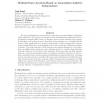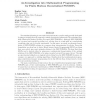JAIR
2010
13 years 10 months ago
2010
We present DCL-PC: a logic for reasoning about how the abilities of agents and coalitions of agents are altered by transferring control from one agent to another. The logical foun...
JAIR
2010
13 years 10 months ago
2010
The paper investigates parameterized approximate message-passing schemes that are based on bounded inference and are inspired by Pearl’s belief propagation algorithm (BP). We st...
JAIR
2010
13 years 10 months ago
2010
The computation of relatedness between two fragments of text in an automated manner requires taking into account a wide range of factors pertaining to the meaning the two fragment...
JAIR
2010
13 years 10 months ago
2010
We develop multiattribute auctions that accommodate generalized additive independent (GAI) preferences. We propose an iterative auction mechanism that maintains prices on potentia...
JAIR
2010
13 years 10 months ago
2010
We present an incentive-compatible polynomial-time approximation scheme for multiunit auctions with general k-minded player valuations. The mechanism fully optimizes over an appro...
JAIR
2010
13 years 10 months ago
2010
We present a novel framework for learning to interpret and generate language using only perceptual context as supervision. We demonstrate its capabilities by developing a system t...
JAIR
2010
13 years 10 months ago
2010
As historically acknowledged in the Reasoning about Actions and Change community, intuitiveness of a logical domain description cannot be fully automated. Moreover, like any other...
JAIR
2010
13 years 10 months ago
2010
Decentralized planning in uncertain environments is a complex task generally dealt with by using a decision-theoretic approach, mainly through the framework of Decentralized Parti...
JAIR
2010
13 years 10 months ago
2010
Because an agent’s resources dictate what actions it can possibly take, it should plan which resources it holds over time carefully, considering its inherent limitations (such a...
JAIR
2010
13 years 10 months ago
2010
To tackle the vocabulary problem in conversational systems, previous work has applied unsupervised learning approaches on co-occurring speech and eye gaze during interaction to au...



